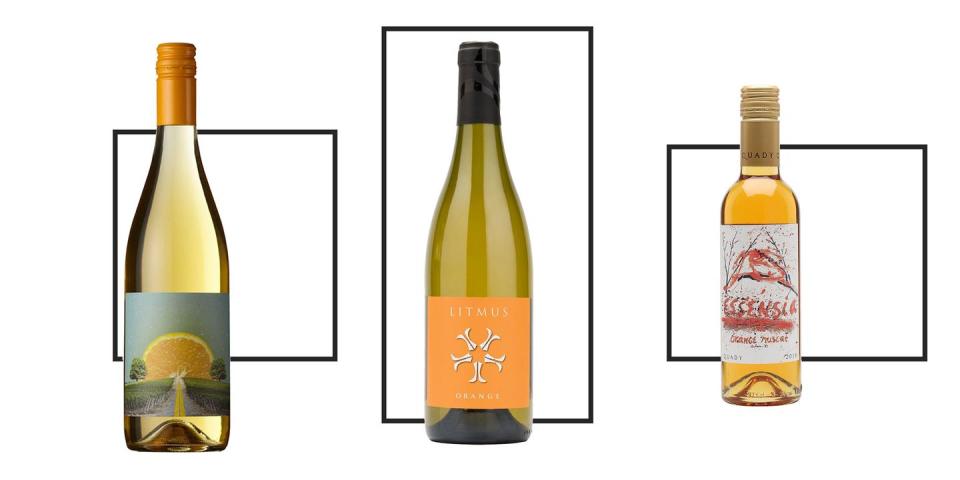5 best luxury orange wines for 2021

Every summer we reach for rosé on autopilot — but what if we were to tell you there’s an exciting alternative? For oenophiles, orange wine is the tipple of choice, offering the biggest thrill right now. Below, our resident wine expert Stacey Smith explains everything you need to know.
What exactly is orange wine?
Bridging the gap between red and white wine, orange wine is created using white grapes, but with a process normally reserved for red wine production. The white juice is left in contact with the grape skins during fermentation (hence the phrase “skin contact”), so instead of a light, fresh and fruity wine, you end up with a more earthy, concentrated flavour.
Although this might sound like a modern way to make wine, countries such as Georgia and Slovenia have been using this method for centuries, long before the use of the mechanical press. As such, many wines are often classed as natural or biodynamic, too.
Is orange wine sweet or dry?
Orange wine is often presumed to be sweet, but this is not the case at all. Although the taste of orange wine will vary hugely depending on the grape used, the location, and time on skins, most often you can expect a full-bodied, bone-dry wine with high tannins.
Commonly, tasting notes will describe orange wine as savoury or sour, sometimes with nutty oxidisation. Fruit might include honeyed apricot or bruised apples, and some of the slightly more experimental styles might also be described as “farmy”.
That said, we have also included a sweet dessert wine recommendation for serving at the end of your next dinner party.
Orange wine food pairings
Orange wines are often very food friendly and offer an excellent talking point when entertaining. Spicy food, in particular, is notoriously tricky to pair with wine — whether that’s the heat from an aromatic Thai curry or the warmth from Morrocan tagines — but most orange wines will handle this with ease. The savoury element also works well with full-flavoured salty cheeses (pecorino, feta and aged gouda spring to mind), autumnal vegetable dishes such as butternut squash risotto, and charcuterie.
How we test
We presented our panel of expert and consumer testers with 11 of the most interesting bottles of orange wines, to see exactly what they thought of each. They assessed each for complexity, balance and finish, so we could bring you five of our favourites to drink right now.
Best orange wine
The bacchus grape is synonymous with English wine and is often likened to sauvignon blanc, but here it takes on a whole new dimension when left in contact with skin for 16 weeks. Made in very limited quantities, it still has that very English appeal, with a fresh green fragrance not dissimilar to a freshly cut meadow. However, the initial burst of tropical fruit gives way to bruised apples, and culminates in a long, memorable finish with pronounced acidity that will cut through rich dishes with ease.
Runner-up orange wine
With herbaceous minerality and thirst-quenching acidity, we’d serve this burnt amber New Zealander as a pre-dinner aperitif. It’s a blend of muscat, pinot gris and gewürztraminer grapes, which offers a complex flavour profile of bruised apple, hazelnut and honeyed apricot. If you’d rather pair with food, the sweet and salty combination works a treat with jamon.
Best champagne-alternative
Replicate the brioche quality of a fine champagne with this slightly spritzy grüner veltliner from Austria. As is typical of this varietal, you’ll find notes of tart green apples moving to a burst of ripe apricot, which reminded some of a dry kombucha.
Most versatile orange wine
The label might give you some indication as to the citrus you’ll find inside this natural, minimal intervention wine, and while it’s not the most complex style we tried, this smooth blend is oh-so-drinkable. Zingy lemon and elderflower add a sherbet freshness, all wrapped up in a bone-dry, crisp finish. We’d pair with laidback pasta lunches, but it would also be just as accommodating with chicken and fish, too.
Best orange dessert wine
End your evening with this elegant half bottle of dessert wine from sunny California. You’ll be rewarded with a delicious bouquet of sweet, dried apricot on the nose, moving to a rich and decadent toasted palate. Pair with tarte tatin, chocolate mousse, or an aged piece of comte.
You Might Also Like

 Yahoo Finance
Yahoo Finance 